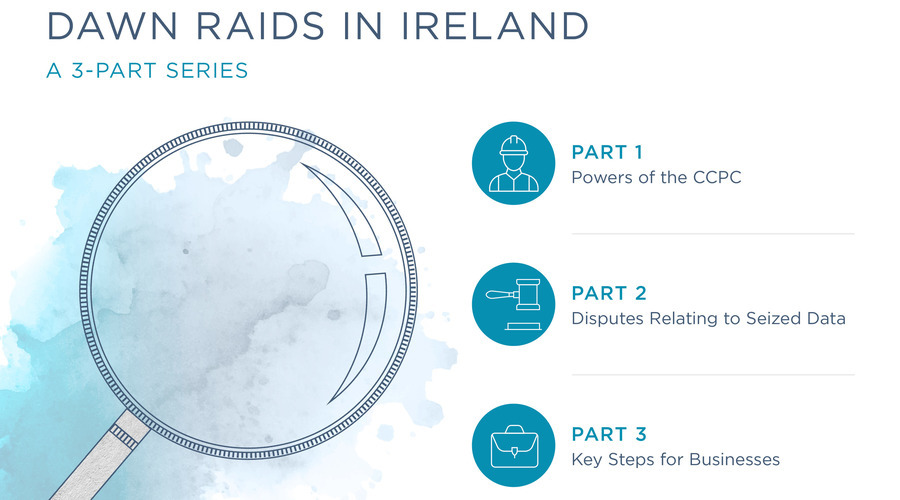Business should prepare for potential unannounced inspections by establishing internal protocols to ensure appropriate systems are in place beforehand. At the minimum, these protocols should include the following key steps:
1. Prepare a Dawn Raid manual and train staff appropriately to ensure they are familiar with both the Dawn Raid manual and on Key Actions required during a Dawn Raid.
2. Ensure that all competition law advice procured is covered by both Irish and EU legal privilege rules.
Crucially, Irish competition law advice should be procured from legal advisors who are licensed and practicing in Ireland. While it is noted that whereas advice by in-house counsel may be protected under Irish law within certain limitations, under the EU law, legal professional privilege generally does not protect competition law advice by in-house counsel, meaning their communications can be reviewed and seized by inspectors.
To protect sensitive information, businesses should consistently mark records and emails as "legally privileged" or "private and confidential" where applicable. This helps to clearly identify and separate communications, making it easier to set it aside during a Dawn Raid or regulatory investigation. Adopting this as a routine practice within the business not only protects confidential legal advice but also accelerates the identification of these sensitive records during a Dawn Raid. Having a records management policy is also advisable.
3. Establish a Dawn Raid response team which could comprise of:
- ● Legal representatives (in-house counsel and external counsel)
- ● Senior management (CEO, CFO, or legal director)
- ● IT and data protection officers
- ● Receptionist and front-line staff (who will be the first point of contact)
- ● Authorised Representative/s (to answer the competition authorities' questions)
4. Ensure your team is well-versed in the essential key actions outlined below to confidently handle a dawn raid.
The EC is empowered to:
● Enter the premises of businesses;
● Examine the records related to the business;
● Take copies of those records;
● Seal the business premises and records;
● Ask members of staff or company representatives questions relating to the subject-matter and purpose of the inspection and record the answers.
Under the Competition Act 2022 (as amended), the CCPC is allowed to search private residences, vehicles, and personal devices (e.g., phones and laptops) used for business activities. Authorised Officers do not have the power to search individuals.
Please refer to our first article in our Dawn Raids in Ireland series on "Powers of the CCPC" for more information.
● Record: Ensure an accurate record of all records copied or seized as well as the questions asked by the inspectors and the answers provided.
● Debrief Employees: Gather all employees involved in the raid and emphasise the need to keep the event confidential.
● Rectify any misinformation: Promptly correct any inaccuracies relayed to Authorised Officers and provide answers to any unresolved inquiries.
● Assess the risk and develop a Response Strategy: Formulate a plan to tackle any problems uncovered during the raid and post raid.
● Challenge: Establish whether the business wants to bring any challenge to the inspection or records seized. This should be done as soon as possible.
● Leniency: Consider whether the business should apply for a "marker" under the Irish/EU leniency regime and/or under the Irish Cartel Immunity Programme.





